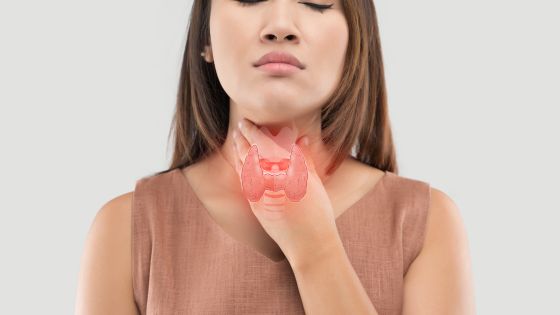Hypothyroidism, also known as underactive thyroid, is a common condition where the thyroid gland does not produce enough thyroid hormones. Around 1 in 20 people in the UK have some degree of thyroid hormone deficiency. The most common underlying cause of hypothyroidism is the autoimmune condition called Hashimoto’s, which occurs when the body’s immune system attacks the thyroid gland. There is no cure for an underactive thyroid, and eventually, you will need medication to reverse the symptoms and replace the thyroxine your body can no longer produce naturally.


Here are 7 of the Most Common Symptoms
1. Fatigue and Weakness
One of the hallmark signs of an underactive thyroid is persistent fatigue, tiredness and lack of energy. Sufferers often notice that they feel exhausted even after adequate nighttime sleep and rest. Simple physical tasks can leave them drained for hours afterwards. Muscle weakness, especially in the upper arms and thighs, frequently accompanies the fatigue.
2. Unintentional Weight Gain
Unexpected weight gain is an early indicator of possible hypothyroidism. A sluggish metabolism means the body burns fewer calories. Thyroid hormones also help regulate chemical reactions that break down fat and protein. When these hormones are lacking, the body tends to store more fat even with no change in diet or physical activity levels.
3. Dry, Coarse and Itchy Skin
Skin changes often occur with an underactive thyroid. The skin tends to become very dry and scaly. It can feel coarse or rough to touch. The constant dryness also leads to increased skin itchiness. Skin myxedema, characterised by thickened skin and puffy complexion, can occur in severe long-term cases.
4. Hair Loss
Moderate hair loss, including both the hair on the scalp and eyebrows, is another common hypothyroidism symptom. The quantity of hair loss can range from slight thinning to patches of baldness. The hair that remains tends to become brittle and dry. Fortunately, hair loss from hypothyroidism is usually temporary and reversible with proper treatment.
5. Muscle Aches, Stiffness and Tenderness
Chronic muscle aches, stiffness and tenderness affect many people with hypothyroidism. The muscles can feel tired even at rest, and simple activities can trigger soreness and pain. The muscle stiffness tends to be most noticeable first thing in the morning. The muscle pain tends to improve slightly with movement and activity.
6. Depression
Feelings of unexplained sadness, anxiety and depression frequently occur in those with low thyroid hormone levels. Hypothyroidism can slow brain functioning and disrupt the production of key neurotransmitters like serotonin. Memory problems and clouded thinking are other potential mental effects. The depression symptoms usually resolve once thyroid levels return to normal.
7. Sensitivity to Cold Temperatures
Those with hypothyroidism tend to feel perpetually chilled and cold. They seem prone to low body temperatures and have trouble maintaining normal heat levels even when air temperatures are mild. Some also experience frequent episodes of cold hands and feet. Layering clothing and trying to stay warm can help relieve the cold sensitivity.
Natural treatments for hypothyroidism can help in the early stages of the disease. A natural treatment for hypothyroidism includes probiotics and a healthy diet. The best natural treatment for hypothyroidism takes a more holistic approach to treating the underlying causes and managing the symptoms of hypothyroidism.
If you have several of the above symptoms, it’s important to see your doctor and get blood tests done to check your thyroid hormone levels. With proper treatment, these symptoms usually improve or resolve.

























